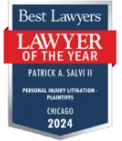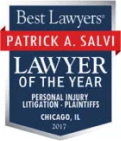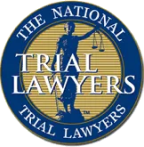
Attorney Fees and Costs - How Do they Work?
Learning how legal fees work can help you decide whether you can afford an attorney. When you understand how attorneys charge their clients, you’ll feel more confident hiring one.
If you have any questions about legal fees, do not hesitate to contact Salvi Schostok & Pritchard P.C. for a free case consultation.
Get help from the nearest personal injury attorney in Chicago
How Are Legal Fees Determined in Illinois?
 State law and ethical rules do not allow lawyers to charge an unreasonable rate for their legal services. Various factors can influence the legal fees an attorney might charge, including:
State law and ethical rules do not allow lawyers to charge an unreasonable rate for their legal services. Various factors can influence the legal fees an attorney might charge, including:
- Experience – Experience contributes to how much an attorney can charge for their services. As with other professionals, more experienced attorneys tend to charge more for their services.
- Legal services provided – Different legal services have different costs. For example, some people hire lawyers to briefly review documents or to file an uncontested divorce on their case. Others hire lawyers to represent them in criminal cases. The fees an attorney charges often depend on the legal issue involved in the case and its complexity.
- Location – Geographic location influences the cost of many services. Often, the closer you live to a major metropolitan area, the higher a lawyer’s fees may be. On the other hand, an attorney may charge high rates if they’re one of the few lawyers serving a rural area or if they provide specialist services.
Understanding what an attorney charges for the services you need is critical. Before signing a written agreement, review it carefully. If you have any questions about our written fee agreement, contact us to discuss it during a free case consultation.
Different Types of Legal Fee Agreements
How lawyers charge for their services can vary across law firms, and the type of law an attorney practices is another factor that may influence fees. The following are common types of fee structures:
- Flat fees – With a flat or fixed fee arrangement, a client pays one fee when they hire a lawyer. This fee covers all legal services performed for their type of case regardless of the number of hours the lawyer works. Attorneys may use the flat fee model when handling relatively simple cases that are unlikely to develop unique complexities or when they can accurately estimate the time of routine legal tasks.
- Hourly fees – Some attorneys use hourly rates. They bill hourly for their work and charge a per-hour fee. Hourly fees can vary widely from one attorney to the next, even within the same firm. Within an individual law firm, the hourly rate can vary depending on such factors as what services a client needs, the attorney’s experience, and the attorney’s status at the firm. For example, a partner may charge a higher hourly rate than an associate at a large firm. If you hire a lawyer who charges by the hour, ask them to estimate how much time they believe they’ll spend on your case. Make sure you understand how the hourly rate could fluctuate depending on the nature of the legal services provided.
- Retainer agreements – Some attorneys charge a retainer fee, which acts as a down payment for their legal services. The attorney requires a client to pay a certain amount of money upfront. For example, a criminal defense lawyer might charge a client $2,500 before they agree to accept the case. They deduct their hourly fees from the retainer as they work on the case. If they use up all of the retainer amount, they may then bill the client for the additional time or request an additional retainer.
- Contingency fees – If a lawyer works on a contingency fee basis, the lawyer only charges the client if they succeed in winning a client’s case. They do not charge for their services upfront. Salvi, Schostok & Pritchard operates on a contingency-fee basis.
How a Contingency Fee Works
Most personal injury attorneys offer contingent fees when taking on new cases.
You hire a personal injury lawyer to seek compensation for losses resulting from injuries someone else caused. Those losses are often financial and may include medical bills, lost wages, and other economic losses.
A qualified personal injury lawyer can help with all aspects of your case. Their understanding of how insurance adjusters operate can boost your odds of receiving a fair settlement. However, no lawyer can ethically guarantee you will receive compensation.
A contingency fee model ensures you don’t have to add to the financial burdens caused by the accident. When you enter into a contingency fee agreement, your lawyer will charge a percentage of the compensation they recover for you, which is outlined in your contract with the firm. Illinois law limits how much a personal injury lawyer can charge, depending on the kind of case you have.
What if you don’t receive compensation? If your lawyer doesn’t secure compensation for you, they don’t receive payment for their legal services.
The contingency fee model offers several benefits. Primarily, it ensures you don’t have to pay your lawyer if you don’t receive a settlement. It also incentivizes a lawyer to fight aggressively for the maximum amount of compensation they recover for you. With a contingency fee arrangement, your lawyer gets paid more when you get paid more.
Difference in Attorney Fees and Costs
A contingency fee agreement usually states a client won’t have to pay attorney fees unless they receive compensation. However, building a case may involve other legal costs that don’t qualify as services a contingency fee agreement covers. Examples of such costs include:
- Court filing fees
- Medical record request fees
- Document copy fees
- Deposition expenses
- Witness fees
- Expert witness expenses
- Telephone calls
- Travel expenses
For example, perhaps you sustained injuries in a car wreck. Proving the crash resulted from the negligence of another motorist may require hiring an accident reconstruction expert. The cost of doing so is an additional fee that a contingency fee agreement often won’t apply to.
Discuss these fees with an attorney when signing a written agreement and ask if you’ll be required to pay them as they come up or after you receive your verdict or settlement. Find out what happens if the lawyer can’t get you any money. Understanding what expenses you do and do not pay will help you make a more informed financial decision when hiring a lawyer.
Contact Us to Learn More About Fee Arrangements During a Free, No-Obligation Consultation
 At Salvi, Schostok & Pritchard P.C., we believe in helping our clients understand all aspects of their cases, including the fees they may pay for our services.
At Salvi, Schostok & Pritchard P.C., we believe in helping our clients understand all aspects of their cases, including the fees they may pay for our services.
Do you need an Illinois personal injury lawyer? If so, we offer an impressive track record of success. During your case review, we’ll gladly provide information about our fees. Get started today by contacting us online or calling us for a free case review.







